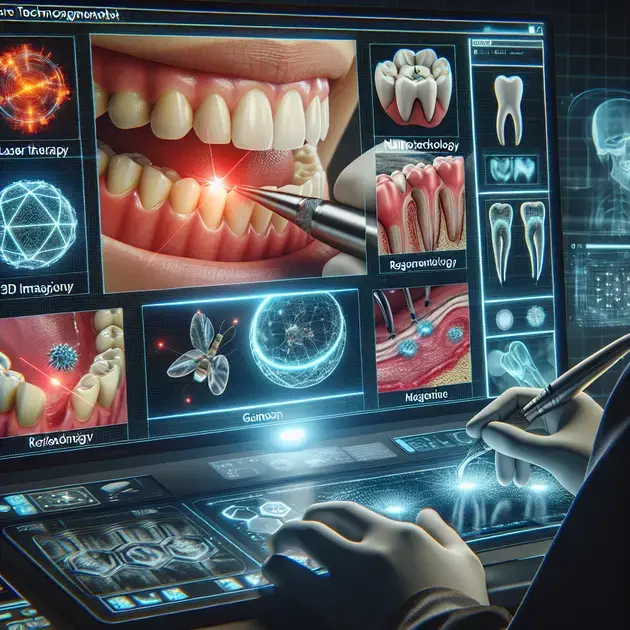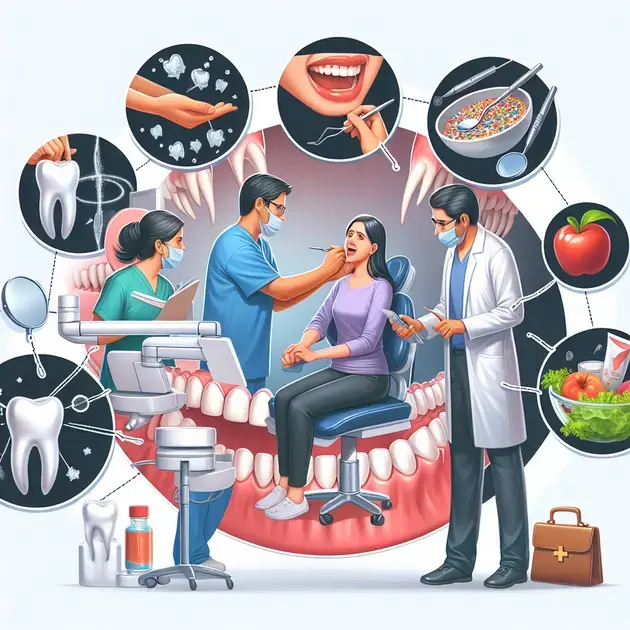Are you looking for comprehensive information on managing periodontitis with medication? Look no further! In this ultimate guide, we will delve into the most effective medications for combating periodontitis and improving oral health.
Periodontitis is a common chronic inflammatory condition that affects the gums and bone supporting the teeth. With the right medication and a consistent treatment plan, you can effectively manage periodontitis and prevent further progression of this disease.

Effective Medications for Periodontitis Management
Periodontitis is a severe gum infection that damages the soft tissue and destroys the bone that supports your teeth. Effectively managing periodontitis involves the use of various medications to control the infection and promote healing. Here are some commonly prescribed medications for periodontitis management:
1. Antibiotics:
Antibiotics are often prescribed to control bacterial infections in the gums. Topical antibiotics, such as mouth rinses or gels, can be applied directly to the infected areas. Systemic antibiotics, such as amoxicillin or doxycycline, are taken orally to target bacteria throughout the body. Consult your dentist or periodontist to determine the most suitable antibiotic for your condition.
2. Antiseptic Mouthwashes:
Antiseptic mouthwashes containing chlorhexidine or essential oils can help reduce plaque and prevent bacterial buildup in the mouth. These mouthwashes are typically used in conjunction with regular brushing and flossing to maintain oral hygiene and control the progression of periodontitis.
3. Enzyme Suppressants:
Some medications work by inhibiting the enzymes that break down gum tissue, helping to reduce inflammation and promote healing. These enzyme suppressants can be in the form of gels or mouth rinses and are often used as an adjunct to scaling and root planing procedures.
4. Pain Relievers:
In cases where periodontitis causes discomfort or pain, over-the-counter pain relievers like ibuprofen or acetaminophen can help manage symptoms. It is essential to follow the recommended dosage and consult your healthcare provider if you experience persistent pain.
5. Prescription Strength Mouthwashes:
In more severe cases of periodontitis, your dentist may prescribe a prescription-strength mouthwash containing a higher concentration of antimicrobial ingredients. These specialized mouthwashes are designed to target specific bacteria and support periodontal health.
How to Create a Consistent Treatment Plan
Developing a consistent treatment plan for periodontitis is essential to effectively manage the condition and prevent further complications. Follow these steps to create a personalized treatment plan:
1. Consultation with a Dental Professional:
Schedule an appointment with a dentist or periodontist to assess the severity of your periodontitis and discuss treatment options. A thorough examination will help determine the appropriate course of action for your specific needs.
2. Comprehensive Oral Health Evaluation:
Undergo a comprehensive oral health evaluation, including x-rays and periodontal probing, to assess the extent of gum disease and identify any underlying issues. This evaluation will serve as the basis for developing a personalized treatment plan.
3. Customized Treatment Recommendations:
Based on the findings of the oral health evaluation, your dental professional will recommend a personalized treatment plan tailored to address your specific needs. This plan may include scaling and root planing, medication therapy, and in some cases, surgical intervention.
4. Ongoing Maintenance and Follow-Up:
Successfully managing periodontitis requires consistent follow-up appointments and ongoing maintenance. Regular cleanings, check-ups, and periodontal evaluations are essential to monitor your progress and make any necessary adjustments to your treatment plan.
5. Home Care Routine:
Adopt a thorough home care routine that includes daily brushing, flossing, and the use of recommended oral hygiene products. Your dental professional may provide specific instructions on proper oral care practices to support your treatment plan.
Preventing Progression of Periodontitis
Preventing the progression of periodontitis is crucial to maintaining oral health and preserving the integrity of your teeth and gums. Follow these preventive measures to reduce the risk of periodontal disease:
1. Maintain Good Oral Hygiene:
Brush your teeth twice a day and floss regularly to remove plaque and prevent gum disease. Use antiseptic mouthwash to reduce bacteria in the mouth and promote oral health.
2. Schedule Regular Dental Check-Ups:
Visit your dentist for routine check-ups and professional cleanings to detect early signs of gum disease and address any concerns promptly. Regular dental visits are essential for maintaining oral health.
3. Avoid Tobacco Use:
Smoking and tobacco use can contribute to the development and progression of periodontitis. Quitting smoking and avoiding tobacco products can significantly reduce your risk of gum disease and other oral health problems.
4. Eat a Balanced Diet:
Follow a balanced diet rich in fruits, vegetables, and whole grains to support overall oral and systemic health. Limit sugary snacks and beverages, as they can contribute to plaque formation and gum inflammation.
5. Manage Stress Levels:
High levels of stress can weaken the immune system and increase the risk of periodontal disease. Practice stress-reducing techniques such as meditation, yoga, or exercise to promote overall well-being and oral health.

1. **The Role of Nutrition in Supporting Periodontitis Treatment**
Introduction
Proper nutrition plays a vital role in supporting the treatment of periodontitis. It is essential to consume a balanced diet rich in nutrients that can help boost the immune system and promote oral health.
Importance of Antioxidants
Antioxidants such as vitamin C and vitamin E can help reduce inflammation and support the healing process in the gums. Including foods like citrus fruits, nuts, and leafy greens in your diet can provide these essential antioxidants.
Omega-3 Fatty Acids
Omega-3 fatty acids have anti-inflammatory properties that can help reduce the severity of periodontitis. Consuming sources of omega-3s such as salmon, chia seeds, and walnuts can be beneficial for managing the condition.
Probiotics and Fermented Foods
Probiotics promote a healthy balance of good bacteria in the mouth, which can contribute to better gum health. Incorporating probiotic-rich foods like yogurt and fermented vegetables can support periodontitis treatment.
Stay Hydrated
Drinking an adequate amount of water is crucial for maintaining good oral health. Staying hydrated can help flush out bacteria and food particles that can contribute to gum disease.
Conclusion
Incorporating a nutritionally sound diet can complement periodontitis treatment and improve overall oral health. By focusing on antioxidant-rich foods, omega-3 fatty acids, probiotics, and hydration, individuals can support their gum health and aid in the management of the condition.
2. **Innovative Technologies for Managing Periodontitis**
Introduction
Advancements in technology have revolutionized the way periodontitis is managed, offering innovative solutions for improved treatment outcomes. These technologies utilize cutting-edge methods to address gum disease effectively.
Laser Therapy
Laser therapy is a minimally invasive treatment option for periodontitis that targets and eliminates diseased tissue while promoting gum regeneration. This technology offers a more comfortable and precise approach to gum disease management.
3D Imaging and Digital Scanning
Advanced imaging techniques such as 3D imaging and digital scanning provide detailed insights into the extent of gum disease and aid in treatment planning. These technologies allow for accurate diagnosis and customized treatment strategies.
Nanotechnology in Oral Care
Nanotechnology has been incorporated into oral care products and treatments to target bacteria and biofilm more effectively. Nanoparticles deliver antimicrobial agents to the gum tissues, reducing inflammation and improving periodontal health.
Regenerative Medicine
Regenerative medicine techniques, such as growth factors and tissue engineering, are being used to stimulate tissue repair and regeneration in the gums. These innovative approaches promote healing and tissue restoration in periodontal therapy.
Conclusion
By embracing technological advancements in the field of periodontitis management, patients can benefit from more efficient and targeted treatment options. Laser therapy, 3D imaging, nanotechnology, and regenerative medicine offer promising solutions for addressing gum disease and enhancing oral health.
3. **The Impact of Stress Management on Periodontitis**
Introduction
Chronic stress can have a significant impact on periodontitis, exacerbating inflammation and compromising immune function. Managing stress effectively is essential for maintaining optimal oral health and supporting periodontitis treatment.
Stress and Inflammatory Response
Stress triggers an inflammatory response in the body, which can worsen the symptoms of periodontitis and hinder the healing process. High levels of stress hormones may weaken the immune system, making individuals more susceptible to gum disease.
Behavioral Strategies for Stress Reduction
Implementing stress-reduction techniques such as meditation, deep breathing exercises, and yoga can help lower stress levels and promote relaxation. These practices have been shown to positively impact overall health, including oral health.
Professional Support and Counseling
Seeking professional support from therapists or counselors can provide individuals with coping mechanisms and strategies for managing stress effectively. Therapy sessions and counseling can address underlying stressors and promote emotional well-being.
Healthy Lifestyle Choices
Engaging in regular physical activity, maintaining a balanced diet, and prioritizing sleep can all contribute to stress management and overall wellness. Healthy lifestyle choices can support the body’s ability to cope with stress and reduce its impact on periodontitis.
Conclusion
By recognizing the link between stress and periodontitis, individuals can take proactive steps to manage stress levels and protect their oral health. Incorporating stress-reduction techniques, seeking professional support, and adopting a healthy lifestyle can play a significant role in supporting periodontitis treatment and promoting gum health.
**
Conclusion
**
Understanding the pivotal role of nutrition in supporting periodontitis treatment is essential for improving oral health outcomes. By incorporating a balanced diet rich in antioxidants like vitamin C and E, individuals can effectively reduce inflammation in the gums and aid in the healing process. Additionally, consuming omega-3 fatty acids from sources such as salmon and chia seeds can help manage the severity of periodontitis, emphasizing the importance of dietary choices in gum health.
The integration of probiotics and fermented foods into one’s diet promotes a healthy oral microbiome, contributing to better gum health and supporting periodontitis treatment. Strategies like staying hydrated by consuming an adequate amount of water play a crucial role in flushing out harmful bacteria and food particles that can exacerbate gum disease, highlighting the significance of hydration in oral health maintenance.
Embracing innovative technologies for managing periodontitis opens up new avenues for more efficient and targeted treatment options. Laser therapy, 3D imaging, nanotechnology, and regenerative medicine offer cutting-edge solutions that enhance gum disease management and overall oral health. By leveraging these advancements, patients can experience improved treatment outcomes and a higher quality of care in addressing periodontitis.
Recognizing the impact of stress on periodontitis underscores the importance of effective stress management in maintaining optimal oral health. Implementing stress-reducing techniques, seeking professional support, and making healthy lifestyle choices are integral in safeguarding against the detrimental effects of stress on gum health. By addressing stress levels proactively, individuals can support periodontitis treatment and promote overall well-being, highlighting the interconnectedness of mental health and oral health.
Ultimately, a comprehensive approach that combines proper nutrition, technological innovations, and stress management strategies can significantly enhance the management of periodontitis and support gum health. By empowering individuals with knowledge and resources to prioritize their oral health, we can work towards a future where periodontitis is effectively managed, and overall oral health is optimized.



